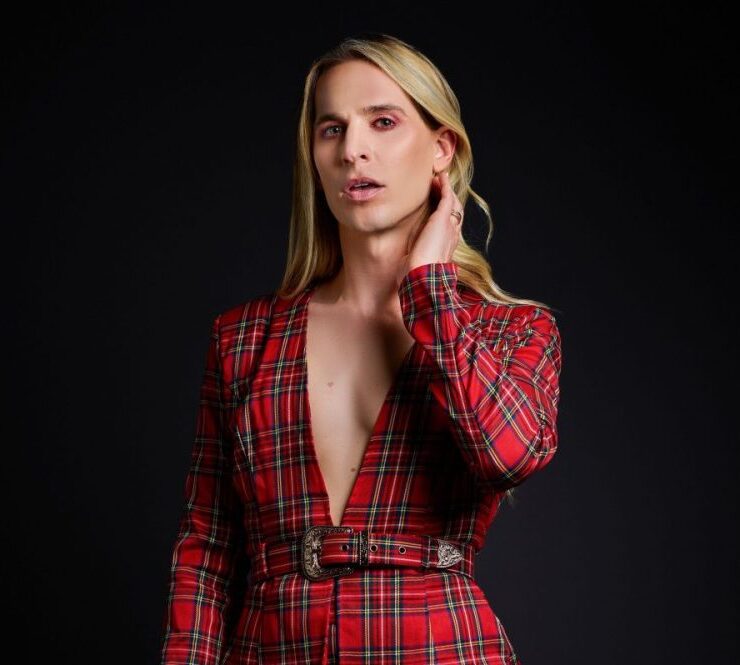Dorian Electra Brings a Dramatically Fluid Appeal

Intersectionality, accessibility, and squashing the sexist, patriarchal norms through queer…
Just as art is meant to defy categorization and conventional norms, what defines a person cannot be placed into a category. Therefore, when a person creates art that leaps outside of genre and challenges gender stereotypes, crossovers and intersections are used as anti-definition.
For musicians like Dorian Electra, the bending of art is as important as bending gender expectations, and they have made sure that it is not an either/or conversation, but one of also/and.
Electra is currently on tour with Charli XCX, a queer ally artist making the way to the top of the charts, and is planning a tour stop through Denver on October 9 with a free afterparty all their own at X Bar.
Getting notoriety in their own right, Electra is known for taking complex, societal topics and both lightening and enlightening the conversation. As a performance artist, they take creative license and a scholarly approach to the messaging in their music. Not one to simply write about love and heartbreak, Electra pushes listeners to think before they speak and to incorporate a curiosity for what may be greater than first impressions.
“If someone told me I have to write a song about “feelings” or a love song, it would be very challenging for me to even become motivated enough to finish it,” said Electra. “I have always been interested in music and making videos since I was a kid, and I studied history in the philosophy of science in college, and I kind of wanted to merge the two.”
Just as in their recent single, “Flamboyant,” Electra takes the word to the extreme and is taking back a term that has been intended to impose a misogynistic demasculinization against the queer community.
Rather than accepting the accusation of flamboyance for embodying an overtly and overly feminine-esque demeanor, as though it is an assault on what is desirable and preferred, Electra takes it and plays with it.
“I thought it would be amazing to do a music video that was styled after Liberace and to dress exuberantly, basically before Elton John was the flamboyant ‘Piano Man.'” Concept and visual components associated with flamboyance led the way as inspiration to create the song.
Electra first broke onto the scene in 2010 with a music video titled “I’m in Love with Friedrich Hayek,” an ode to their praise of the Austrian economist. Over the next few years, Electra explored songwriting and dove into a video project assignment from Refinery29 in 2016 on the history of sexuality and gender. Electra wanted to expand the conversation through a greater historical approach than a simple sex-ed lesson, thinking about the historical implications of neutered storytelling.
“The history of the clitoris is something that is really not talked about and has a lot to do with the history of feminism and bleeds into queer history and how femininity and queerness has been viewed over the history in western culture,” said Electra.
Upon release, the video went viral and quickly racked up more than 2 million views. Due to this success, the single project was developed into a series.
“I did other music videos about the history of drag, the history of high heels, and the history of vibrators,” said Electra. “After that series was finished, I started making my own music that was less explicitly educational and more of my favorite stuff, history, science, and philosophy.”
Electra continued to take a philosophical approach to music, pushing the sound of pop from a comfortable place into a one of deep thought over traditionally contemptuous topics.
With their song and video release of “Career Boy,” Electra dons a power suit and their signature drawn-on mustache. The singer makes a corporate copy room and stale office coffee satirically sexy-fied. In the most recent video drop, “Daddy Like,” Electra is seen taking on varying personas and iterations of daddys, from velour tracksuits to gregarious purple feathers and backup dancers.
“I’ve always been drawn to the masculine side more; my idols as a kid were Mick Jagger, David Bowie, and Alice Cooper,” Electra explained. “I’d always wanted to really explore that, but it wasn’t until I started going with my own gender identity, then the more that it opened up the door for me to start exploring those things. In a way, that felt very natural to me.”
What has come to feel the most natural for Electra is to identify as gender fluid, bringing out the campy sides of both binaries, mixing and mingling what feels right depending on context and mood.
So, it makes sense that Electra’s songs softly weave between feminine and masculine themes with nothing standing out as more or less significant. While the content and context of each song and video may differ, one thing remains highlighted in each video: a theatrical exploration of gender through over-the-top fashion statements.
“The history of fashion is a huge, huge interest of mine, and that has absolutely fueled so much of my work,” said Electra. “One of my favorite parts is researching historical fashions and then putting in an interesting, modern twist. I love the history of fashion and how it relates to the history of gender and sexuality, and how this things change over time.”
Through this fluid exploration of gender, one common misconception that Electra faces is the drag king “qualifier” in a way of labeling or putting a familiar title on their art.
“I think it’s really cool, because there are a lot of amazing drag kings out there whose work is not being highlighted, and some people don’t even know that drag kings exist, but I don’t identify as that,” Electra clarified. “Some people read ‘drag king’ as a woman dressed up as a man, just like a drag queen is a man dressed up as a woman, and it’s so much more complex than that.”

Just as the identity of drag king doesn’t fit Electra’s art, the identity of nonbinary didn’t always feel like a good fit, either.
“For me, weirdly, I did not really identify with the term ‘nonbinary’ for a really long time, because I just assumed it was not either one, not masculine or feminine, or man or woman,” Electra said. “That’s definitely not what it means at all; it just means that you don’t fall neatly into either one of those categories, that you could be any combination thereof, or something totally different.
“I feel like I’m a little of both or all of them, so then when I came across the term gender fluid, I felt like that really struck a chord with me. I like the lightness of it; it’s really a chill term.”
Gender can feel constraining, even within the queer community, and Electra sees a correlation in the ways that the queer community forms identifiers to sexuality as well.
“Especially for cis men, there’s so much pressure even within the gay community; either you are gay or you are not; there’s not really open space for fluidity or being bisexual,” Electra said.
How closely, then, is Electra’s sexuality tied to their gender? They aren’t one and the same, but they aren’t separate, just as the genres of music are fluid, their sexual identity is truly an also/and rather than either/or.
“My gender is definitely tied in with my sexuality, which is interesting, too, because by definition when we describe sexuality, or sexual orientation, it assumes gender,” Electra said. “When you describe yourself as a homosexual, you mean that you are attracted to someone of the same sex so that implies your gender identity in your orientation.
“For me, I just love queer in terms of my orientation and gender identity, it is a great umbrella term that says I’m outside of the normal situation here; I’m open and fluid in many ways,” said Electra.
Identifying as fluid and queer are not as new for most within the LGBTQ community, but with getting mainstream attention, Electra is a person who many are experiencing those terms for the first time because of.
“I may not be for everybody, because some people see me as a clown dressing up in all these crazy costumes, but I do believe that we can change so much of culture through art and through music,” said Electra. “Some of the most radical things can come from that first and then have this effect on mainstream culture that happens more slowly.”
*Photos by Charlotte Rutherford
What's Your Reaction?
Intersectionality, accessibility, and squashing the sexist, patriarchal norms through queer pearls of wishful wisdom.










